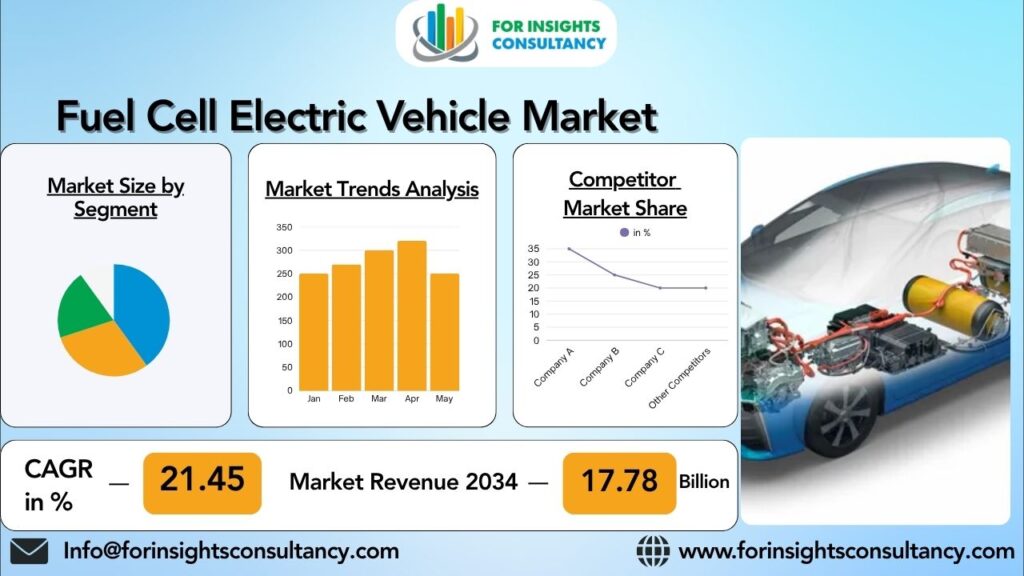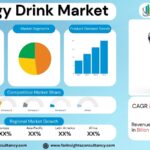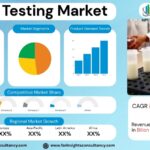
Fuel Cell Electric Vehicle Market 2025 Research Report By Distance (Short, Long), By Vehicle (Heavy Duty Vehicle, Agriculture, Buses, Port Vehicles/ Container Handling or Transport, Automotive, Class 8/ Long Haul, Forklift, E-bikes), and by Region- Global Forecast to 2034
May-2025 Formats | PDF | Category: Automotive | Delivery: 24 to 72 Hours
“The Fuel Cell Electric Vehicle Market is expected to expand from 3.08 Billion in 2025 to $ 17.78 Billion in 2034, with a compound annual growth rate of 21.45% “
Fuel Cell Electric Vehicle Market: Overview and Growth in the Upcoming Year
In the automotive industry, the development of Fuel Cell Electric Vehicles (FCEVs) has resulted in a recent technological explosion. These vehicles, which run on hydrogen fuel cells, offer a more environmentally friendly alternative to traditional gasoline-powered vehicles. The growing demand for eco-friendly transportation is expected to drive a significant increase in the market for fuel cell electric vehicles in the upcoming year.
Fuel cell electric vehicles are one type of electric vehicle that primarily runs on hydrogen. Unlike battery-electric vehicles, which store power in rechargeable batteries, FCEVs generate electricity through a chemical reaction between hydrogen and oxygen. FCEVs are a zero-emission option for consumers who are concerned about the environment because the only by product of this process is water vapour.
One of the primary reasons for this growth is the government’s support of sustainable energy initiatives. The incentives and subsidies that many countries are offering to promote the adoption of FCEVs are increasing consumer interest and demand for these vehicles. Additionally, a wider range of users are becoming available for FCEVs due to advancements in the hydrogen refuelling infrastructure.
Although the market for fuel cell electric vehicles has promising growth potential, there are still problems that need to be fixed. One of the main obstacles is the high cost of producing hydrogen fuel cells, which could make FCEVs more expensive than traditional gasoline-powered cars.
However, as production costs decline and technology improves, FCEVs are becoming more affordable and competitive in the automotive industry. Furthermore, manufacturers are investing in research and development to enhance the performance and efficiency of fuel cell technology, opening up new growth opportunities for the FCEV market.
For Insights Consultancy’s latest market intelligence study, “Global Fuel Cell Electric Vehicle Market 2025, Growth Opportunities, and Forecast,” provides a comprehensive analysis of the Food industry. The report includes demand analysis, industry insights, competition intelligence, and a customer database. It also offers strategic insights into future trends, growth determinants, supplier landscape, demand landscape, CAGR, and pricing analysis. The study also includes Porter’s Five Forces Analysis, PESTLE Analysis, Value Chain Analysis, 4 Ps’ Analysis, Market Attractiveness Analysis, BPS Analysis, and Ecosystem Analysis.
*Note: Sample of the report provides details on the scope and coverage, table of contents, research methodology, and Sample Framework of the report. Actual report of 110+ is available for purchase to all the interested stakeholders.
Top Companies Covered In This Report:
- US Hybrid
- Hyundai Motor Co., Ltd.
- Hydrogenics
- Honda Motor Co., Ltd.
- Anhui Hell
- Plug Power, Inc.
- Shanghai Shenli Technology Co., Ltd.
- Hyster-Yale Materials Handling
- Audi AG
- Dana Limited
- Toyota Motor Corporation
- Ballard Power Systems
Industry News
3 April, 2025 Hyundai Motor Unveils ‘the all-new NEXO’ FCEV with Bold New Design and Enhanced Technology
Hyundai Motor introduced the all-new NEXO at the Seoul Mobility Show 2025, marking a significant milestone in hydrogen mobility.
February 19, 2025 Honda Reveals Specification for its Next-generation Fuel Cell Module
TOKYO, Japan, February 19, 2025 – Honda Motor Co., Ltd. today made its first global release of specifications for Honda Next Generation Fuel Cell Module and Honda Fuel Cell Power Generator at H2 & FC EXPO – the 23rd Int’l Hydrogen & Fuel Cell Expo – which started today at Tokyo Big Sight, Japan. Mass production of the Honda Next Generation Fuel Cell Module is scheduled to begin in 2027 (fiscal year ending March 31, 2028), with mass production of the Honda Fuel Cell Power Generator scheduled to begin in 2026.
Detailed Segmentation and Classification of the report (Market Size and Forecast – 2034, Y-o-Y growth rate, and CAGR):
Segment By Distance
- Short
- Long
Segment By Vehicle
- Heavy Duty Vehicle
- Agriculture
- Buses
- Port Vehicles/ Container Handling or Transport
- Automotive
- Class 8/ Long Haul
- Forklift
- E-bikes
Regional Deep-dive Analysis:
North America
United States
The US is a major player in the global market for fuel cell electric vehicles thanks to significant investments in research and development. The country has a well-established infrastructure for fuel cell technology and has been actively promoting the use of fuel cell electric vehicles through a number of programmes and incentives. Due to the launch of new models by major manufacturers and growing consumer awareness of the benefits of clean transportation, the US market for fuel cell electric vehicles is expected to grow significantly over the coming years.
Canada
Canada is a major market for fuel cell electric vehicles in North America. The country has been investing in hydrogen infrastructure and promoting the use of fuel cell technology in transportation. Canada, which prioritises reducing greenhouse gas emissions and improving air quality, is one of the major markets for fuel cell electric vehicles. The government has been actively encouraging the development of fuel cell technology and offering incentives to encourage people to switch to clean transportation options. As a result, it is projected that the fuel cell electric vehicle market in Canada will grow rapidly in the near future.
Asia-Pacific
China
China has emerged as a global leader in the adoption of fuel cell electric vehicles, or FCEVs, as a result of the government’s strict regulations that promote the use of clean energy vehicles. The country is home to several FCEV manufacturers, including Nio, and is investing heavily in the development of hydrogen infrastructure. Over the coming years, China’s demand for FCEVs is expected to rise as a result of a growing focus on reducing emissions and improving air quality.
India
The government is growing increasingly interested in promoting clean energy vehicles, even though the FCEV market in India is still in its early stages. Companies like Mahindra & Mahindra and Tata Motors are exploring opportunities in the FCEV sector through pilot programmes and alliances with international partners. As India looks to reduce pollution and its carbon footprint, FCEVs might be crucial to the country’s transportation sector.
Japan
Japan has been at the forefront of the development of FCEV technology, with companies such as Toyota setting the standard for manufacturing hydrogen fuel cell vehicles. The Japanese government has taken the lead in promoting FCEVs by providing incentives, subsidies, and the construction of hydrogen refuelling stations across the country. As a result, sales of FCEVs have been increasing steadily in Japan, which is currently one of the Asia-Pacific region’s largest markets for hydrogen-powered vehicles.
South Korea
South Korea is also advancing in the fuel cell electric vehicle market thanks to Hyundai and Kia’s introduction of FCEV models to the country. The South Korean government has set ambitious targets for the adoption of FCEVs and is working to improve the nation’s hydrogen infrastructure. With a strong focus on innovation and sustainability, South Korea is well-positioned to become a significant player in the global FCEV market.
Europe
Germany
Germany leads the FCEV market and has a robust infrastructure to support them. The country’s extensive network of hydrogen refuelling stations makes it an attractive place to adopt FCEVs. Incentives and subsidies from the government are also crucial for promoting market growth. Companies like Mercedes-Benz and Volkswagen are making aggressive investments in FCEV technology, which further solidifies Germany’s position in the market.
France
France has also been making strides in the FCEV sector, with a growing number of hydrogen refuelling stations located across the country. Government initiatives such as the Hydrogen Plan aim to promote the development of FCEVs and infrastructure. Companies like Toyota and Renault are leading the charge to promote FCEVs in France, which is assisting in the general growth of the market.
United Kingdom
The UK is another important player in the European FCEV market. The government’s aggressive carbon emission reduction targets are driving the adoption of FCEVs as a clean transportation option. Companies like Honda and Hyundai have been actively promoting FCEVs in the UK, with a focus on the construction of refuelling stations. The country aspires to become a hub for FCEV innovation and technology in the years to come.
Italy
Italy has been aggressive in promoting FCEVs in line with its commitment to reduce carbon emissions and transition to clean energy. The country has been investing in hydrogen infrastructure with a focus on creating an atmosphere that promotes the use of FCEVs. Fiat and Alfa Romeo are the top FCEV promoters in Italy, offering a range of automobiles to satisfy customer demand.
Spain
Spain is also emerging as a potential market for FCEVs as a result of increased awareness of the environmental benefits of hydrogen fuel cell technology. The government has been investing in infrastructure development with plans to expand the network’s number of hydrogen refuelling stations. Companies like SEAT and Nissan are looking into opportunities in Spain’s FCEV market in order to satisfy the growing demand for eco-friendly transportation options.
Middle East and Africa
Saudi Arabia
Saudi Arabia, which is well-known for having vast oil reserves, is attempting to diversify its energy sources. The government has announced plans to invest in FCEV infrastructure in an effort to reduce dependency on fossil fuels and promote sustainability in the transportation sector.
UAE
The UAE is leading the way in developing clean energy initiatives. The Dubai Clean Energy Strategy 2050 includes plans to increase the share of clean energy in the total energy mix. FCEVs are expected to be essential to achieving these objectives.
South Africa
South Africa faces issues with air pollution and environmental degradation. Because of their potential to address these issues, the government has implemented legislation to promote the use of FCEVs. The country’s abundant solar and wind resources put it in a good position to produce green hydrogen for FCEVs.
The research provides answers to the following key questions:
- What is the expected growth rate of the Fuel Cell Electric Vehicle Market from 2025-2034?
- What are the key driving forces shaping the market during the forecast period?
- Who are the major market vendors and what winning strategies have helped them occupy a strong foothold in the Fuel Cell Electric Vehicle Market?
- What are the prominent market trends influencing the market’s development?
Key insights provided by the report that could help you take critical strategic decisions?
- Regional reports analyse product/service consumption and market factors in each region.
- Reports highlight possibilities and dangers for suppliers in the Fuel Cell Electric Vehicle Market business globally.
- The report identifies regions and sectors with the highest growth potential.
- It provides a competitive market ranking of major companies, as well as information on new product launches, partnerships, business expansions, and acquisitions.
- The report includes a comprehensive corporate profile with company overviews, insights, product benchmarks, and SWOT analysis for key market participants.
Customization: We can provide following things
1) On request more company profiles (competitors)
2) Data about particular country or region
3) We will incorporate the same with no additional cost (Post conducting feasibility).
Any Requirement Contact us: https://forinsightsconsultancy.com/contact-us/
Table of Contents
For TOC Contact us: https://forinsightsconsultancy.com/contact-us/






